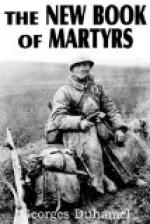“Mustn’t hurt me.”
As soon as I could distinguish and understand the boy’s words, I called him by his Christian name. I would say:
“How are you, Marie?” or “I am pleased with you, Marie.”
This familiarity suits him, as does my use of “thee” and “thou” in talking to him. He very soon guessed that I speak thus only to those who suffer most, and for whom I have a special tenderness. So I say to him: “Marie, the wound looks very well today.” And every one in the hospital calls him Marie as I do.
When he is not behaving well, I say:
“Come, be sensible, Lerondeau.”
His eyes fill with tears at once. One day I was obliged to try “Monsieur Lerondeau,” and he was so hurt that I had to retract on the spot. However, he now refrains from grumbling at his orderly, and screaming too loudly during the dressing of his wound, for he knows that the day I say to him “Be quiet, Monsiuer”—just Monsiuer—our relations will be exceedingly strained.
From the first, Carre bore himself like a man. When I entered the dressing ward, I found the two lying side by side on stretchers which had been placed on the floor. Carre’s emaciated arm emerged from under his blanket, and he began to lecture Marie on the subject of hope and courage.... I listened to the quavering voice, I looked at the toothless face, lit up by a smile, and I felt a curious choking in my throat, while Lerondeau blinked like a child who is being scolded. Then I went out of the room, because this was a matter between those two lying on the ground, and had nothing to do with me, a robust person, standing on my feet.
Since then, Carre has proved that he had a right to preach courage to young Lerondeau.
While the dressing is being prepared, he lies on the ground with the others, waiting his turn, and says very little. He looks gravely round him, and smiles when his eyes meet mine. He is not proud, but he is not one of those who are ready to chatter to every one. One does not come into this ward to talk, but to suffer, and Carre is bracing himself to suffer as decently as possible.
When he is not quite sure of himself, he warns me, saying:
“I am not as strong as usual to-day.”
Nine times, out of ten, he is “as strong as usual,” but he is so thin, so wasted, so reduced by his mighty task, that he is sometimes obliged to beat a retreat. He does it with honour, with dignity. He has just said: “My knee is terribly painful,” and the sentence almost ends in a scream. Then, feeling that he is about to howl like the others, Carre begins to sing.
The first time this happened I did not quite understand what was going on. He repeated the one phrase again and again: “Oh, the pain in my knee!” And gradually I became aware that this lament was becoming a real melody, and for five long minutes Carre improvised a terrible, wonderful, heart-rending song on “the pain in his knee.” Since then this has become a habit, and he begins to sing suddenly as soon as he feels that he can no longer keep silence.




